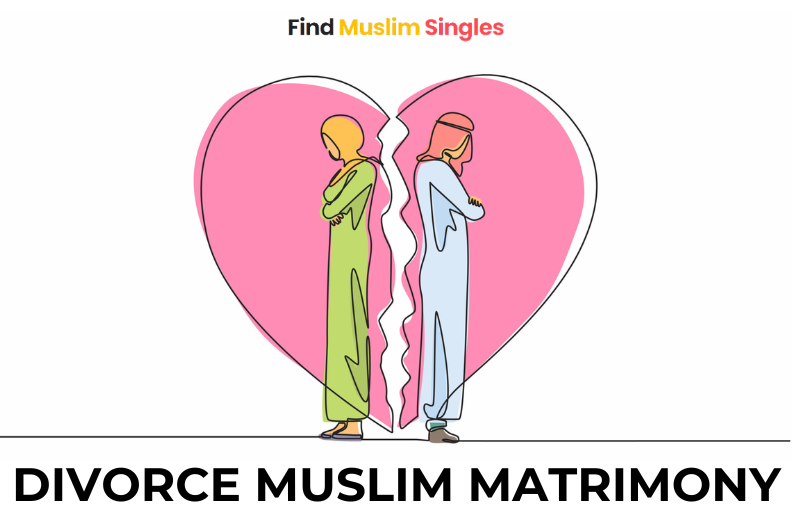
Exploring Legal and Shariah-based Solutions for Divorce Muslim Matrimony
In Muslim matrimony, divorce is a profound and multifaceted aspect that intertwines religious, legal, and social dimensions. Understanding the complexities of divorce within Islamic jurisprudence is crucial for individuals navigating the often intricate and emotionally charged process. In this extensive exploration, we delve into the rights and procedures surrounding divorce Muslim matrimony, shedding light on the legal frameworks and Shariah principles that govern this significant facet of family law.
The Complexity of Divorce Muslim Matrimony
The decision to seek divorce within Muslim matrimony is not taken lightly. “Talaq,” as known in Islamic jurisprudence, represents more than just the dissolution of a marital contract; it involves a profound impact on the lives of individuals and families. Factors such as irreconcilable differences, abuse, or infidelity may contribute to the decision, highlighting the need for a comprehensive understanding of the legal and Shariah-based solutions available for the single muslim divorcee.
Head over to our blog for guidance and support in all matters related to Muslim marriage and dating.
Legal Frameworks for Divorce Muslim Matrimony
In regions with large Muslim populations, legal frameworks exist to regulate divorce proceedings within divorce Muslim matrimony. These frameworks may blend aspects of Shariah law with secular legislation, aiming to provide a fair and just resolution to marital disputes. For instance, countries like India and Pakistan have codified Muslim personal laws that govern divorce proceedings for Muslim citizens. In Western countries, divorce laws may be based on secular legal principles, emphasizing the importance of a nuanced approach to accommodate diverse cultural and legal landscapes for divorce Muslim matrimony.
FindMuslimSingles provides a safe and understanding environment for Muslims all over the world
Shariah-based Solutions for Divorce in 2024
Shariah, the Islamic legal system derived from the Quran and Hadith, provides specific guidelines and procedures for the Muslim matrimony divorced brides. Shariah principles emphasize justice, fairness, and mutual respect throughout the divorce process, acknowledging the rights and responsibilities of both parties involved.
Understanding the Types of Divorce in Shariah
Shariah recognizes different forms of divorce, each carrying distinct procedures and implications:
- Talaq: The most commonly known form, where the husband initiates divorce through a verbal pronouncement. Talaq may be revocable or irrevocable, influencing the potential for reconciliation and remarriage.
- Khula: A form of divorce initiated by the wife, requiring mutual consent and often involving financial negotiations. Khula provides women with the right to dissolve the marriage, acknowledging the importance of agency and choice.
- Faskh: Judicial divorce granted by a Shariah court based on specific grounds such as cruelty, neglect, or failure to fulfill marital obligations. Faskh involves legal proceedings, testimony, and evidence, ensuring a just resolution to marital disputes.
Our diverse Muslim dating website helps you find the right partner for you regardless of age, status and location, add your profile today, and let love find you.
Rights and Responsibilities of Divorcing Parties
The process of divorce Muslim matrimony entails a set of rights and responsibilities for both spouses:
- The right to seek divorce for valid reasons, as outlined in Shariah law, while adhering to due procedures.
- The right to a fair and equitable division of assets, including financial support for the wife and dependent children.
- The right to maintain custody and guardianship of children, prioritizing their best interests.
- The responsibility is to observe the waiting period (iddah), during which reconciliation is encouraged, and certain restrictions apply.
- The responsibility to uphold any prenuptial agreement or marital contract, providing a legal framework for the dissolution process.
Everyone deserves a chance at love, start your search on one of the most trusted Muslim matchmaking platforms and start your journey to find love again.
Procedures for Divorce Muslim Matrimony
The procedures for divorce in Islamic matrimony are influenced by factors such as the type of divorce sought and the legal jurisdiction. Talaq and khula may involve consultation with religious scholars, mediation, and formal documentation. Faskh, being a judicial process, necessitates filing a petition with the relevant Shariah court, presenting evidence, and attending hearings before a judge.
Challenges and Considerations for Divorcees
Despite the existence of legal and Shariah-based solutions for divorce Muslim matrimony various challenges persist:
- Access to Legal Resources: Marginalized or vulnerable individuals may face barriers in accessing legal resources and representation during divorce proceedings.
- Social Stigma: Cultural barriers and societal stigma may deter individuals, particularly women, from seeking divorce even in situations of hardship or abuse.
- Impact on Children: The impact of divorce on children and families, including issues related to custody, visitation, and financial support, requires careful consideration and sensitivity.
- Educational Initiatives: Continued education and awareness-raising efforts are necessary to promote understanding of divorce rights and procedures within Muslim communities.
Muslim Marriage Sites for Divorcees in 2024
In recent years, there has been a growing recognition of the unique needs and challenges faced regarding divorce Muslim matrimony. As a result, specialized Muslim polygamy sites catering specifically to divorcees have emerged. These platforms provide a supportive and understanding environment for individuals who have gone through divorce, offering features tailored to their circumstances. From personalized matchmaking services to forums for sharing experiences and advice, these sites aim to empower divorcees to embark on a new journey towards finding companionship and love within the bounds of Islamic principles. By fostering a community of mutual support and understanding, Muslim marriage sites for divorcees play a crucial role in facilitating connections and rebuilding lives after divorce.
Concluding
In conclusion, navigating divorce Muslim matrimony necessitates a profound understanding of the legal frameworks and Shariah-based solutions governing the process. By recognizing the rights and responsibilities of divorcing parties, adhering to established procedures, and addressing challenges with empathy and understanding, individuals and families can navigate this challenging transition with dignity and fairness. While divorce is a complex and often painful experience, it can also serve as an opportunity for personal growth, healing, and the pursuit of a more fulfilling future within the bounds of Islamic principles.

